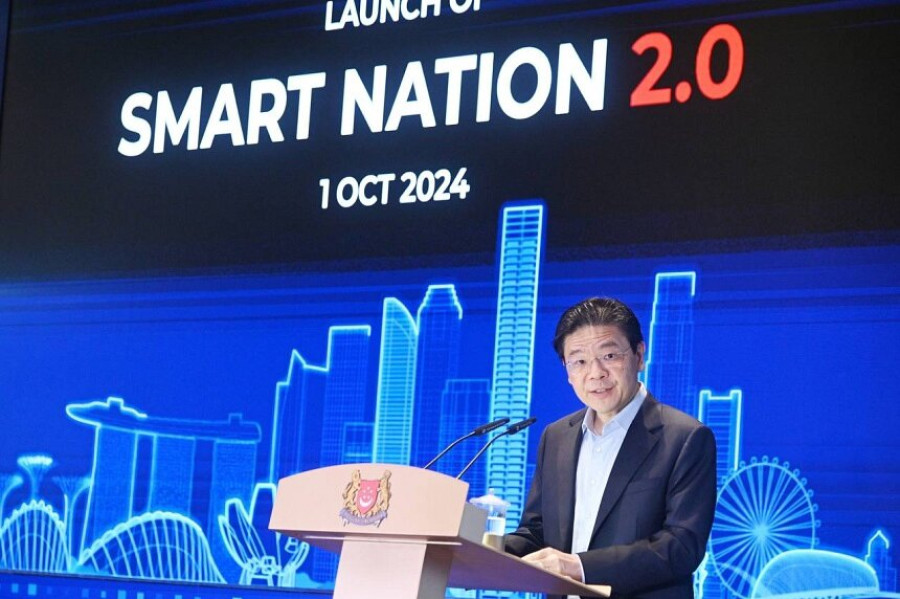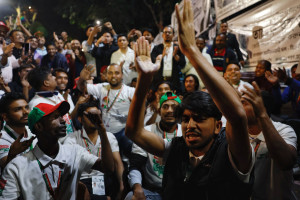World
Singapore refreshes Smart Nation goals to tackle digital harms, accelerate AI know-how
Prime Minister Lawrence Wong said that Singapore must sharpen its focus on “three building blocks” in the next phase of its journey to becoming a technologically enabled nation.
The Straits Times
Plans are afoot to equip scientists and students with artificial intelligence (AI) know-how and offer swift remedies to victims traumatised by cyber bullying and deepfakes circulating online, as Singapore charts its next Smart Nation milestones.
Announcing the refreshed Smart Nation 2.0 plan on Oct 1, Prime Minister Lawrence Wong said that Singapore must sharpen its focus on what he described as the “three building blocks” in the next phase of its journey to becoming a technologically enabled nation.
The building blocks of growth, community and trust go beyond a narrow focus on digitalisation, the hallmark of Singapore’s first Smart Nation plan launched in 2014.
“The digital landscape today is vastly different from a decade ago when our first Smart Nation plan was launched,” said PM Wong at the launch held in the Punggol Digital District, which has been earmarked as Singapore’s first Smart Nation business district.
“Smartphones and social media have become the main ways we communicate with each other. Perhaps the biggest change is the recent breakthroughs in generative AI,” he said.
But with these tech changes come new threats, as outlined in the newly launched Smart Nation 2.0: A Thriving Digital Future For All report by the Ministry of Digital Development and Information.
In particular, digital developments have given rise to scams, cyber bullying, misinformation, online polarisation, deepfakes and technology-induced isolation that deepen social divides.
Workers also worry about job disruptions if they cannot cope with technological changes.
In addressing these challenges, the refreshed Smart Nation 2.0 has outlined ways to equip citizens with skills to thrive in the digital economy, foster a community spirit through digital inclusion, and build online safety and trust.
Under the growth mandate, PM Wong announced a new grant to give scientific research here a leg-up in using AI tools.
The new $120 million AI for Science grant by the National Research Foundation aims to turbocharge biomedical, health sciences and advanced materials research by promoting AI proficiencies among researchers in public institutions.
This grant adds to the more than $500 million already invested in AI projects that span multiple sectors since 2019 through national research programme AI Singapore.
“We want to grow this AI ecosystem, and foster more collaborations between AI researchers and scientists in other domain areas like biomedical and materials sciences,” said PM Wong.
“We must start early and do even more to prepare our children.”
Starting in 2025, primary and secondary schools will roll out new AI for Fun coding modules to let children tinker with technology incorporating AI, to better prepare the next generation of workers.
“Today, our children are digital natives. But we must still give them more deliberate exposure to AI. This will help them better understand the nuances, limitations and abilities of AI tools,” said PM Wong.
A new Smart Nation Educator Fellowship will also be available to educators who shape the national curriculum, to expose them to the latest trends and issues in the digital space.
Inclusion is also a big theme under the refreshed Smart Nation 2.0.
Singapore will double down on outreach efforts to ensure that more citizens, including seniors, learn to use digital skills with confidence, though key services will continue to be available over physical counters.
Government-linked active ageing agency Council for Third Age (C3A), for one, will develop over 180 courses to help seniors become proficient in setting up and using smart devices, transacting and communicating online, searching for online information and safeguarding against risks.
“Technology, when used responsibly, can connect people, foster collaboration and strengthen community. But if misused, it can divide and erode trust,” said PM Wong.
For example, excessive use of social media can contribute to isolation, mental health issues and the spread of misinformation, he added. It can also create echo chambers, where individuals are exposed only to views that reinforce their own, leading to greater division within society.
To tackle some of these harms, there are plans to introduce new laws to speed up redress for victims of online harm.
A new agency will also be set up to act on their behalf to ensure, say, the swift takedown of abusive content. More details will be available over the next few months.
Currently, victims can apply for a court protection order or make a police report. But legal and criminal proceedings take time, said PM Wong.
And while Singapore’s Online Safety Act introduced in 2022 requires major social media platforms to remove harmful content such as that which promotes suicide and terrorism, the law does not specify a timeframe for redress or address cyber bullying, deepfakes and non-consensual sharing of intimate images.
Another new law called the Digital Infrastructure Act is also expected in 2025 to hold cloud services and data centre operators to greater accountability, as any failure of their infrastructure could disrupt Singapore’s economy and society.
This law will cover system misconfigurations and outages caused by fires, water leakage and cooling system failures – areas not covered by Singapore’s Cybersecurity Act.
“Recent incidents around the world have shown us that digital disruptions can severely affect lives, leaving hospitals, airports and businesses unable to function,” said PM Wong.
He also made a call to all Singaporeans to play their part, whether in learning new digital skills or trying a new digital service.
“Smart Nation is a call to all Singaporeans. Over the last decade, we have made great strides. In the next 10 years, we can reach even greater heights,” he said.
The Punggol Digital District is key to helping Singapore achieve its new goals. The 50ha district, targeted to complete construction by early 2025, is earmarked to showcase cyber-security, smart living and smart estate solutions.
The Silicon Valley-style district will house a business park, which is being developed by national industrial estate developer JTC Corporation, to foster greater collaboration between government, academics and tech talent.
Secured tenants include OCBC Bank, UOB, the Government Technology Agency, Cyber Security Agency of Singapore and the Singapore Institute of Technology.
“A decade ago, this was an empty field. Today, it is Singapore’s first-ever smart district, with companies, research institutes and government agencies working together in areas like cyber security, AI and robotics,” said PM Wong.
In a Facebook post on Oct 1, Minister for Digital Development and Information Josephine Teo said: “Smart Nation 2.0 means continuing our efforts to support Singaporeans in navigating rapid technological change. We will update laws where needed, build safety nets, and grow our digital economy and talent pool, even in the absence of a clear playbook globally.”
Ms Soh Swee Ping, chief executive officer of C3A, applauded the inclusiveness of Smart Nation 2.0, saying: “By keeping key services available on physical platforms, it demonstrates thoughtful consideration for those who need it most, and this care is truly heart-warming.”
-In association with the Asia News Network




 21.82°C Kathmandu
21.82°C Kathmandu









.JPG&w=300&height=200)





